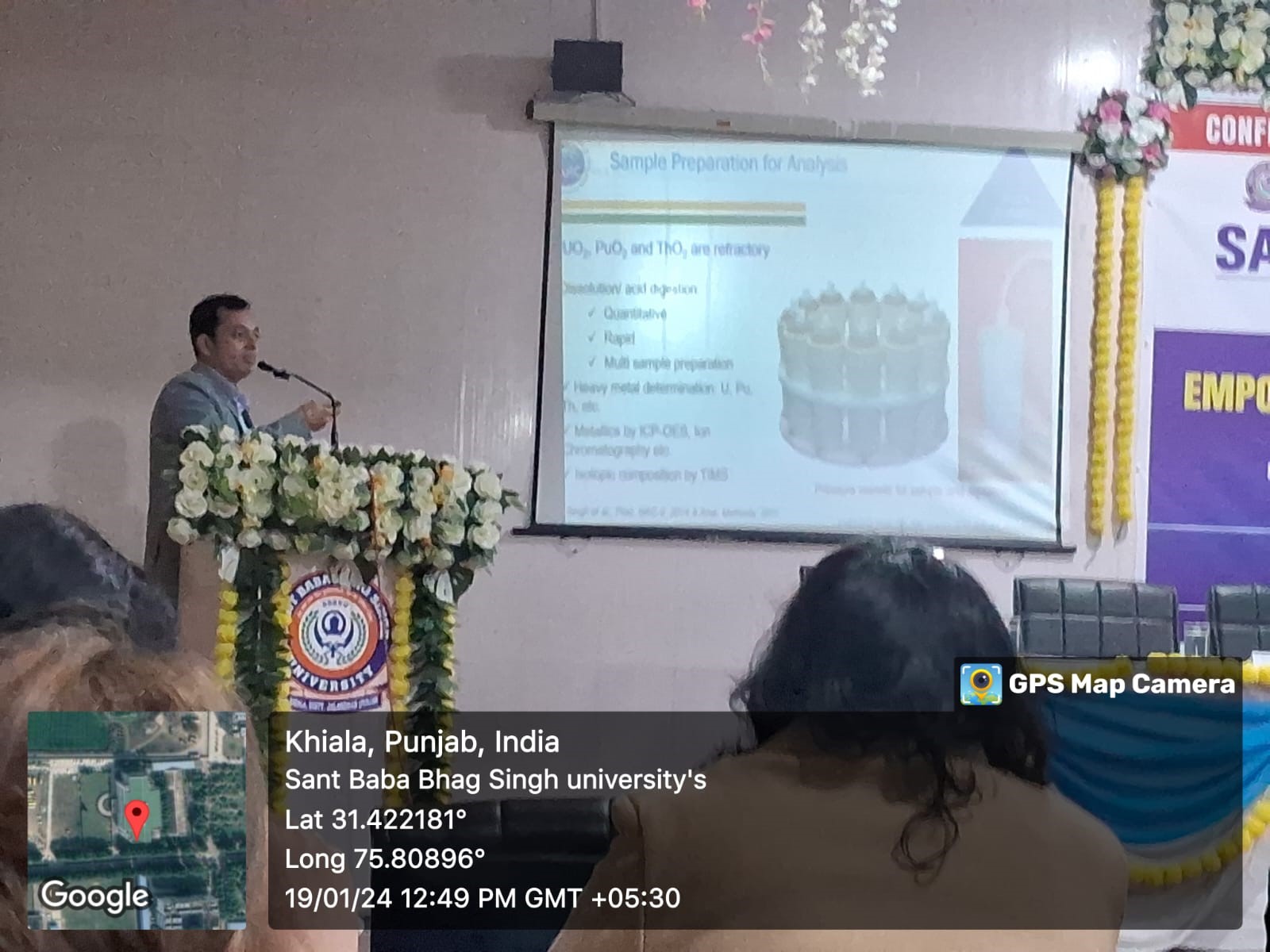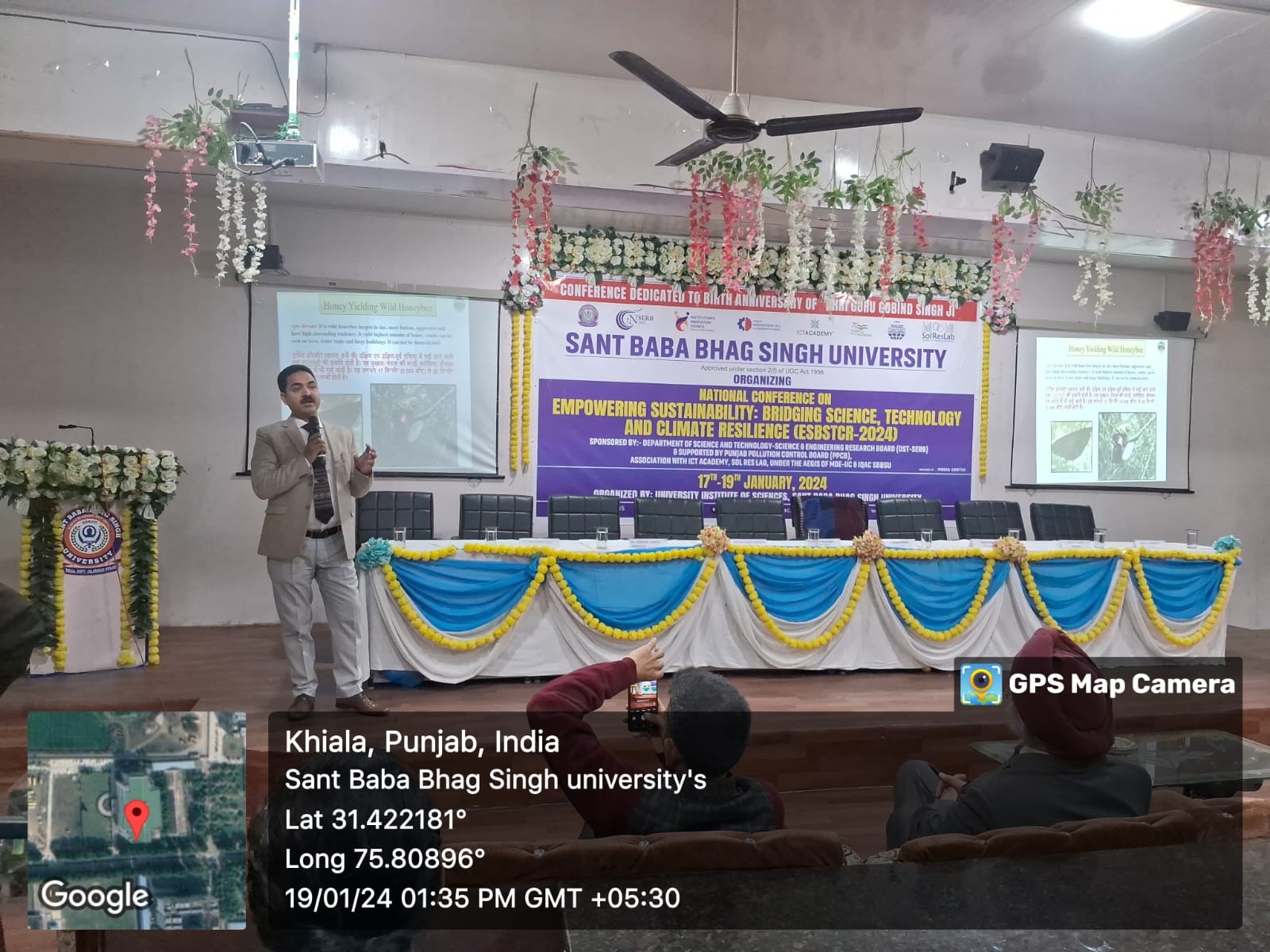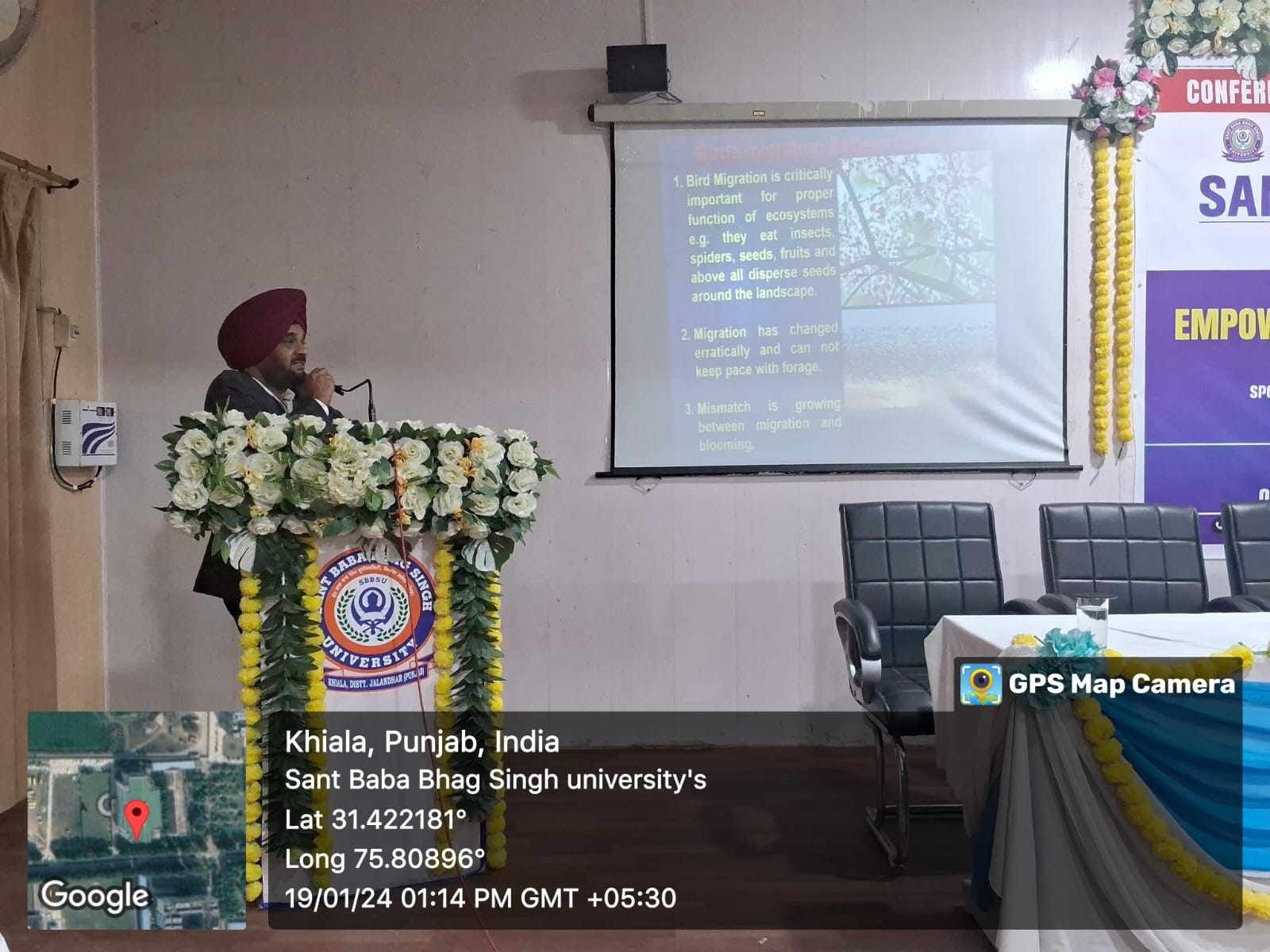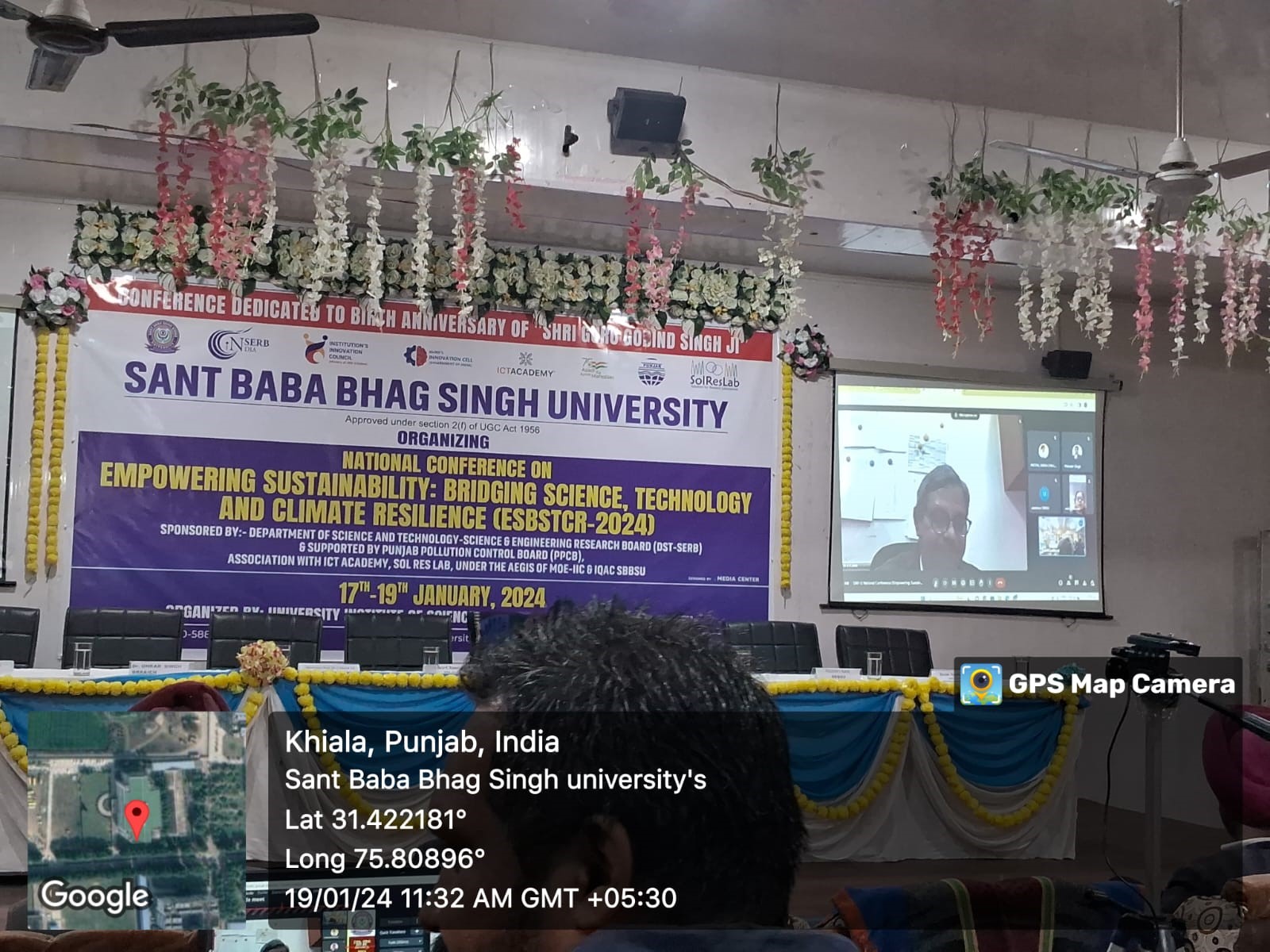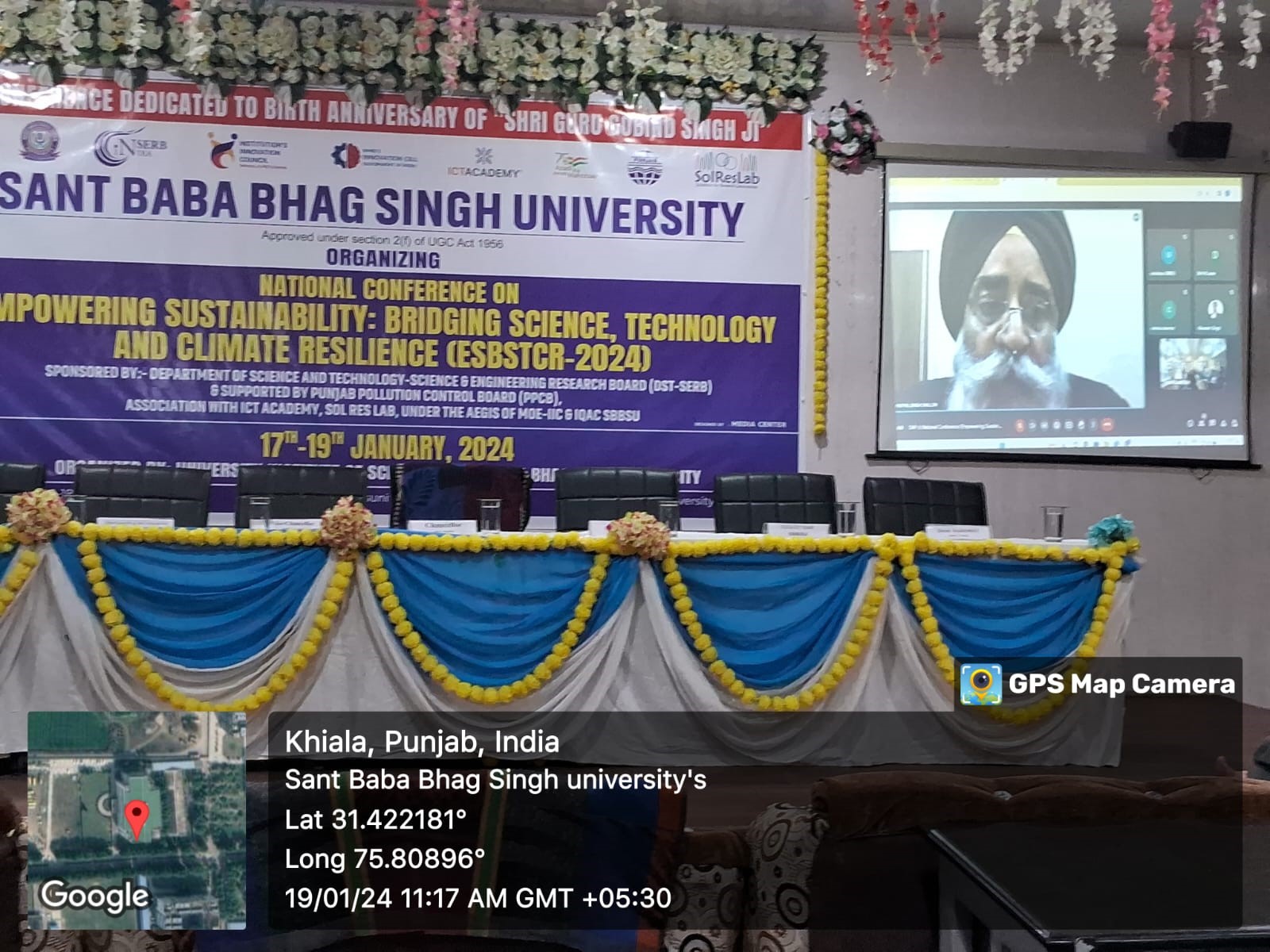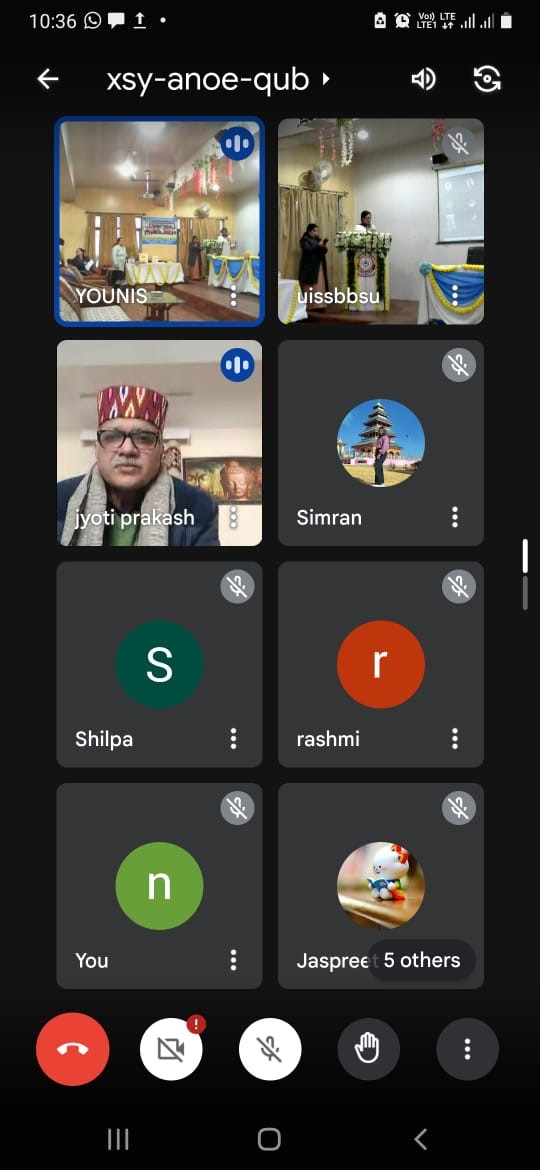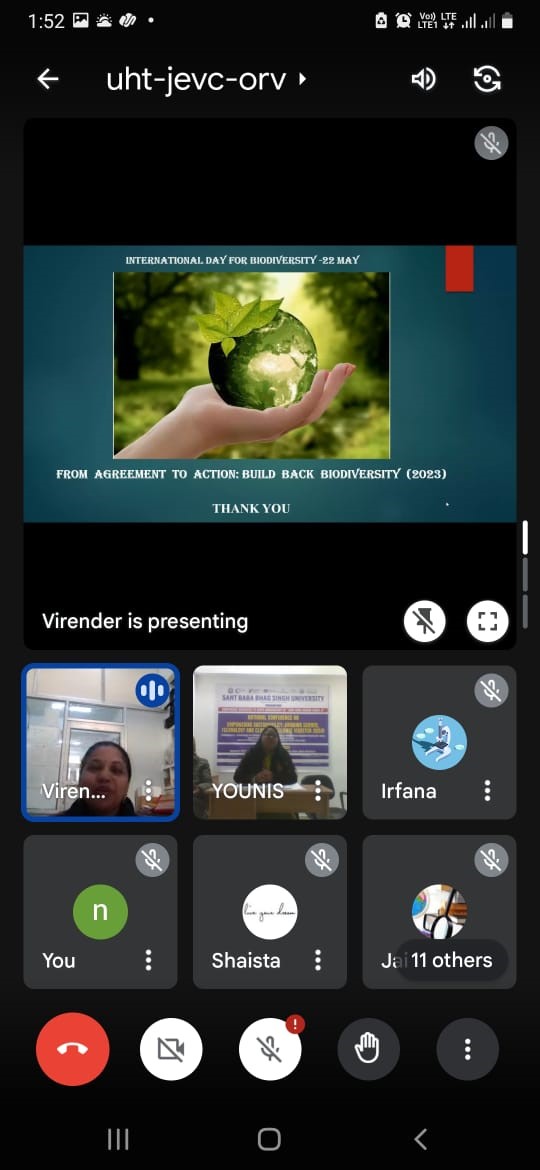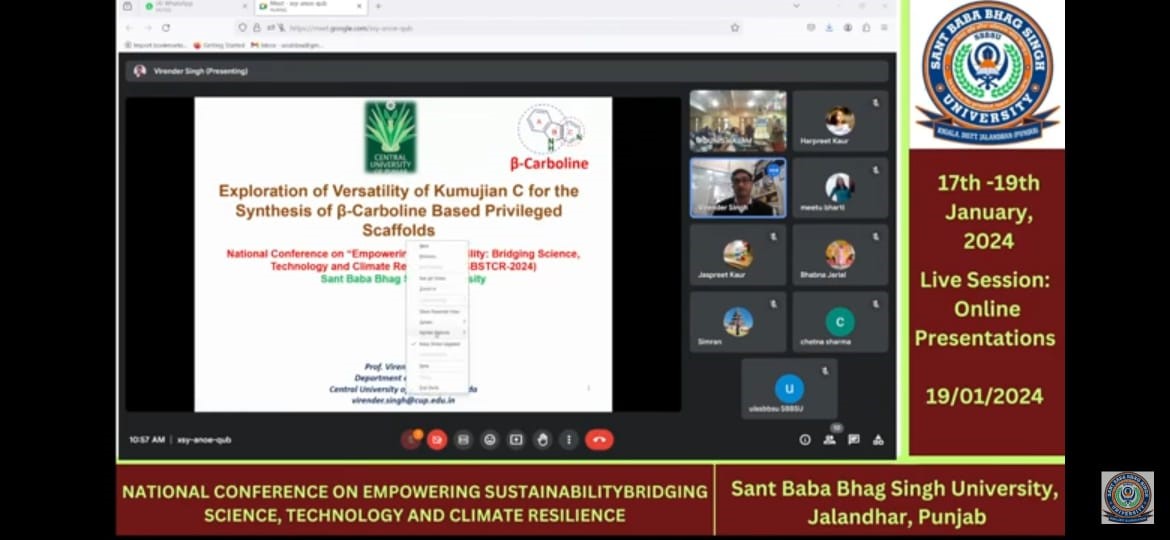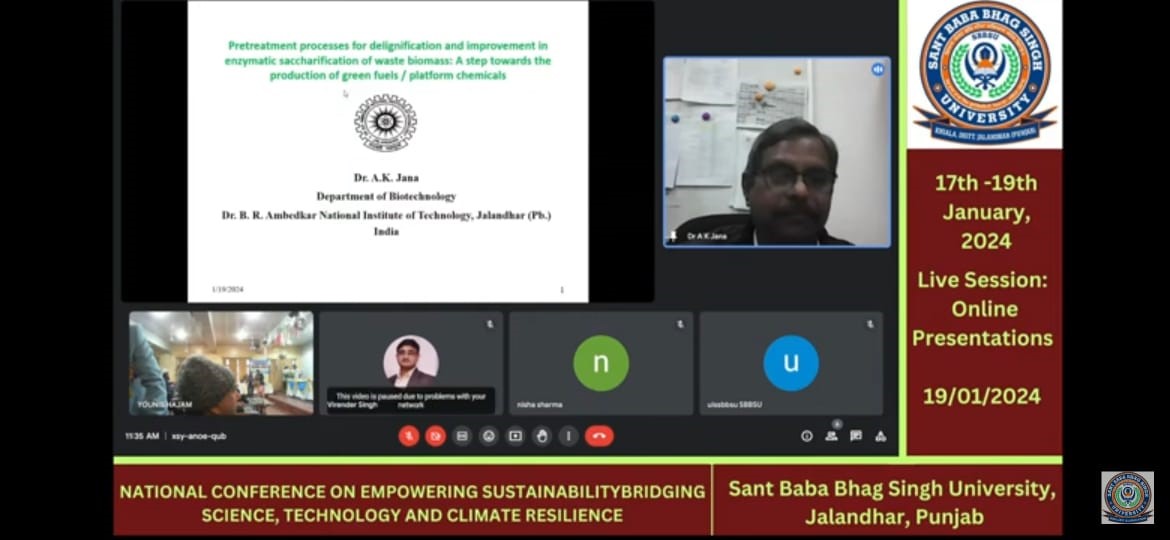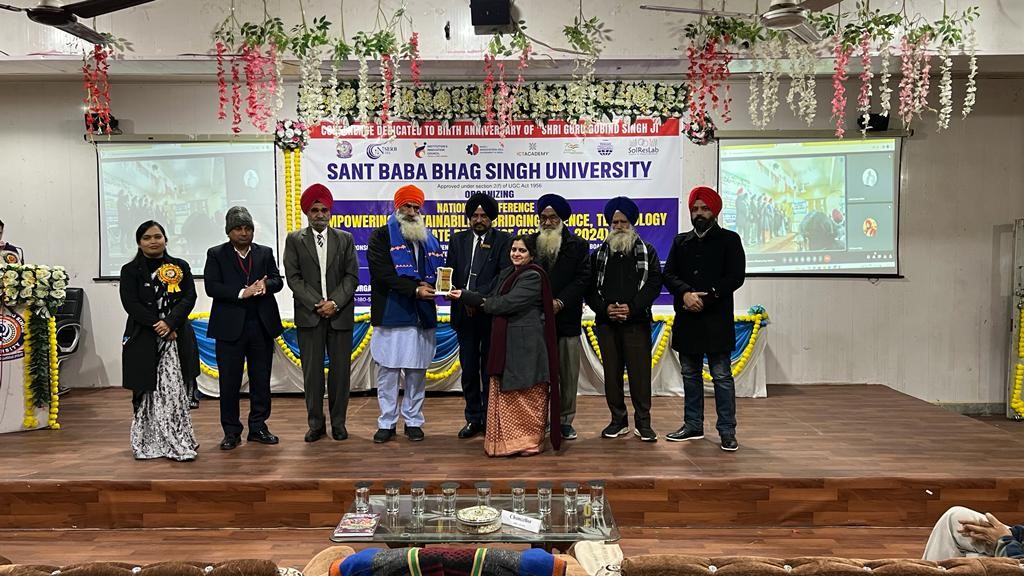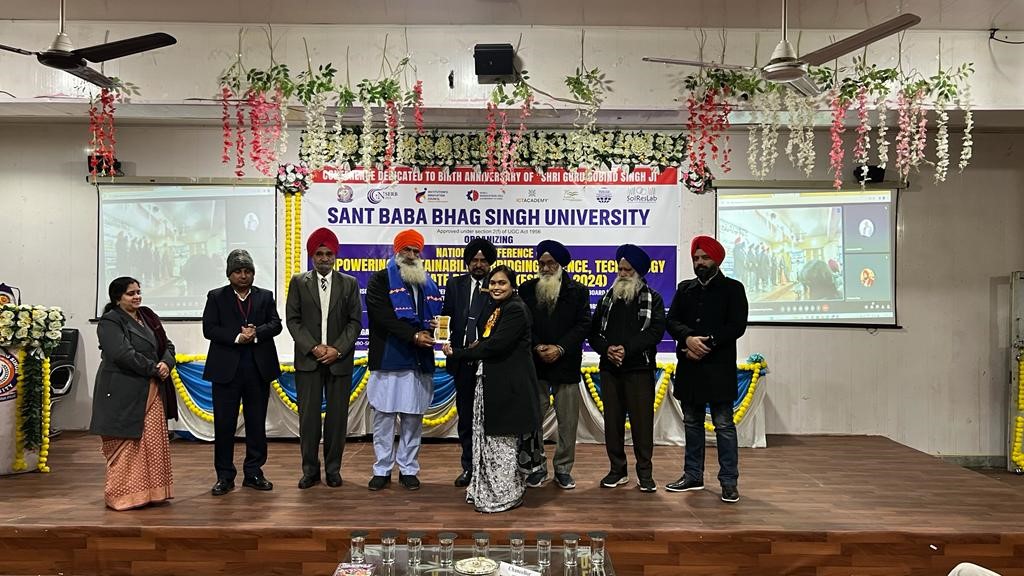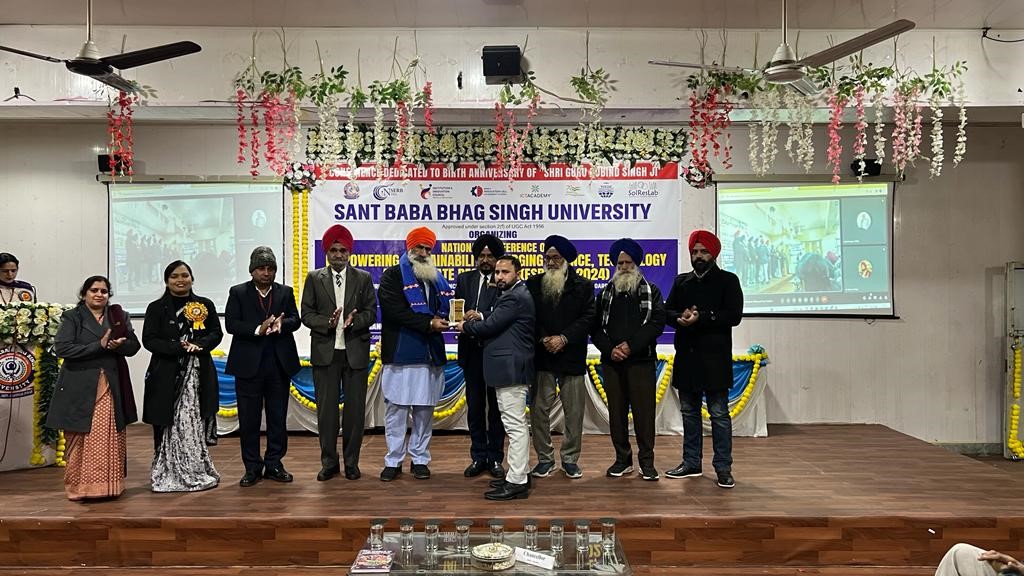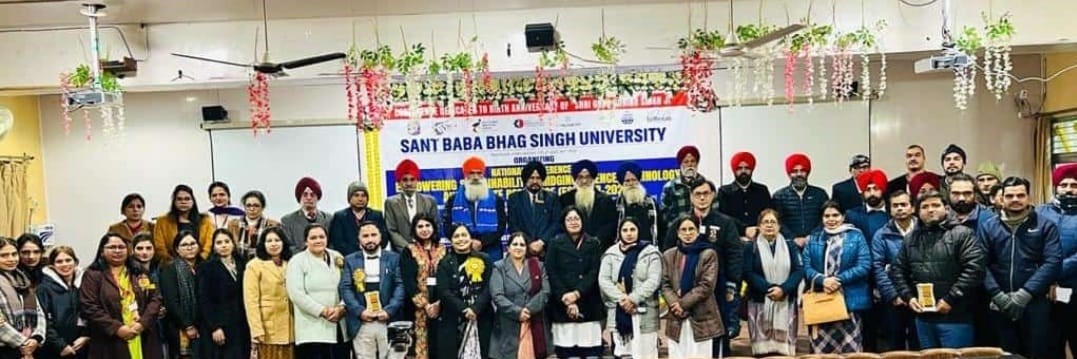National Conference “Empowering Sustainability: Bridging Science, Technology and Climate Resilience” (ESBSTCR 2024)
Date: 17-01-2024 to 19-01-2024
Day-1
Today, 17.01.2024 (Wednesday), Sant Baba Bhag Singh University has launched the Three-Day National Conference "Empowering Sustainability: Bridging Science, Technology, and Climate Resilience" (ESBSTCR 2024), which is sponsored by DST-SERB and Sol Research Lab, supported by the Punjab Pollution Control Board (PPCB), and organised in collaboration with ICT Academy under the aegis of MoE-IIC (Ministry of Education- Institution's Innovation Cell) and IQAC, SBBSU. This conference is held to commemorate the birth anniversary of Shri Guru Gobind Singh ji. The conference is held in hybrid mode (online and offline) to provide flexibility and accessibility to a large audience. The focus of ESBSTCR 2024 is to debate all potential solutions to such environmental concerns in order to contribute to the preservation of life on Earth for a longer length of time. This conference will provide a good opportunity to share information and experiences in diverse research fields. On the first day of the programme, the Worthy Vice Chancellor of SBBSU welcomed the invited guests, academicians, and participants and acquitted all with the history and achievements of Sant Baba Bhag Singh University. Prof. (Dr.) R. C. Sobti, Padamshri awardee, Professor Emeritus, Former Vice-Chancellor, Panjab University, Chandīgarh, and Baba Saheb Bhim Rao Ambedkar University, Lucknow, was the day's chief guest and keynote speaker. The conference began with a Shabad gayan, followed by a lamp-lighting ceremony. Sant Baba Manmohan Singhji, Honourable Chancellor SBBSU, S. Hardaman Singh Minhas, Secretary SBBSMCS, Prof.(Dr.) Dharamjit Singh Parmar, Vice Chancellor SBBSU, Prof. (Dr.) R. C. Sobti (Chief Gest), Prof. (Dr.) A. S. Ahluwalia, Pro-Chancellor, Eternal University, Baru Sahib (Guest of Honour), Prof. (Dr.) Pardeep K. Chhuneja, Former Head, Department of Entomology, PAU (Expert speaker), Prof (Dr.) Nareshpal Singh Saini, Head Department of Physics, GNDU and Dr. Dharam Paul Chaudhary, Principal Scientist IIMR, PAU, Ludhiana (Resource person) have graced the occasion. Prof (Dr) OP Agarwal Former Vice Chancellor, Jiwaji University, Gwalior, and Prof (Dr.) Narinder Singh from IIT Ropar were present via online mode. Prof Sobti expressed his excitement at SBBSU's lush green campus, emphasizing the lessons we may learn from the lives of Lord Rama (Disciplined life), Lord Krishna (Karma), and the Sikh Guru (How to serve society). He also emphasized the importance of sustainability, claiming that our bodies are the perfect example of it. He wished the conference success and highlighted the need of green and sustainable practices. Prof. (Dr.) A.S. Ahluwalia praised the university's efforts to provide education to rural students. Prof (Dr) OP Agarwal conveyed his best wishes in an online inauguration address, emphasising the importance of clean and safer environmental practices, as well as the sensitivity taught by the Swachh Bharat programme across many sectors of society. Prof. (Dr.) Pardeep K. Chhuneja discussed the importance of the environment and emphasized honey production and apiculture as futuristic sustainable businesses. Prof. (Dr.) Nareshpal Singh Saini of GNDU campaigned for following the Sikh Gurus' teachings about respect for nature. Prof. (Dr.) Narinder Singh emphasised the importance of taking action to address environmental challenges in the current situation. Dr. Dharam Paul Chaudhary inspired the attendees with his perspectives on the importance of maize research and the future prospects of maize as a material for food and fuel production. Dr. Gurnam Singh Rasoolpur, Principal, Sant Baba Dalip Singh Memorial Khalsa College Domeli, Kapurthala was also present in the programme. Conference souvenir was also released at the end of the opening session. Dr. Shweta Singh, Dean (University Institute of Sciences), presented the conference theme and objectives. She emphasized the overwhelming reaction of participants from throughout the country to this meeting. She anticipates that all attendees will make valuable contributions to this event and encourages interdisciplinary collaboration and information exchange in pursuit of long-term sustainability and resilience. Dr. Nisha Sharma (Convener of the Conference) has presented detailed technical programme of three day conference. Several expert lectures were held online and offline in accordance with the schedule. More than 40 poster and oral presentations by researchers have been held. The first day of the conference concluded with a variety of informative and enlightening presentations and insights from experts and participants.
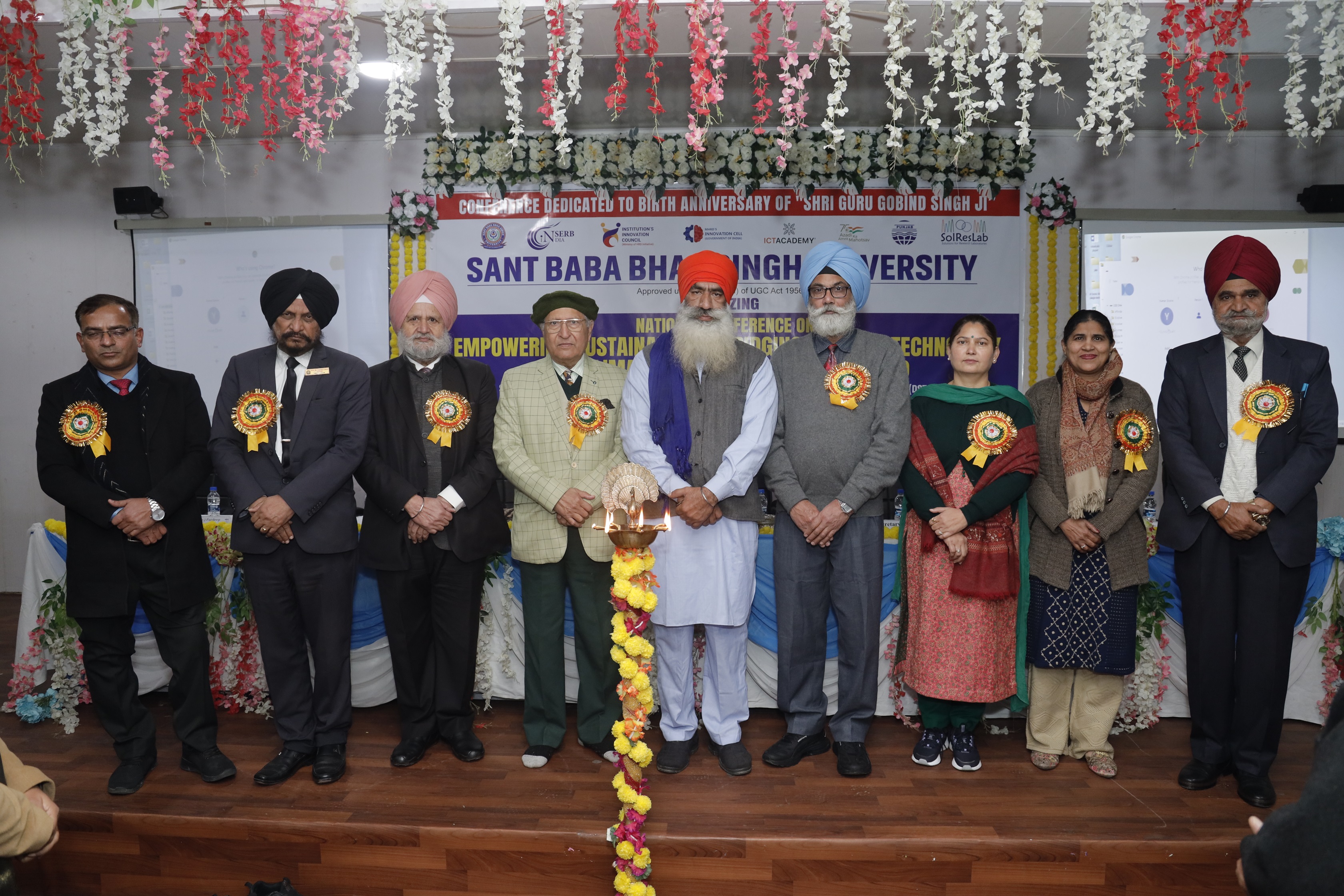
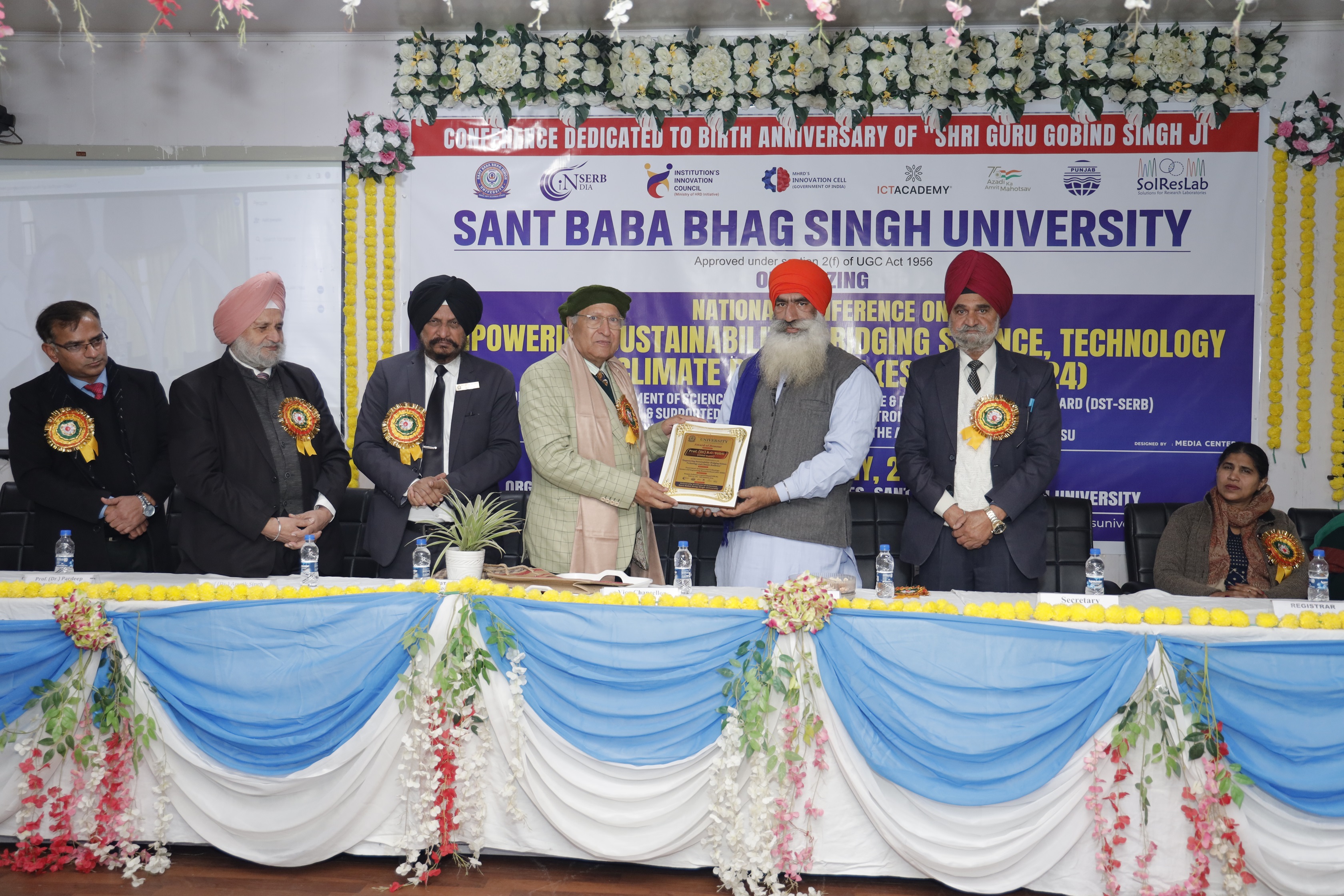
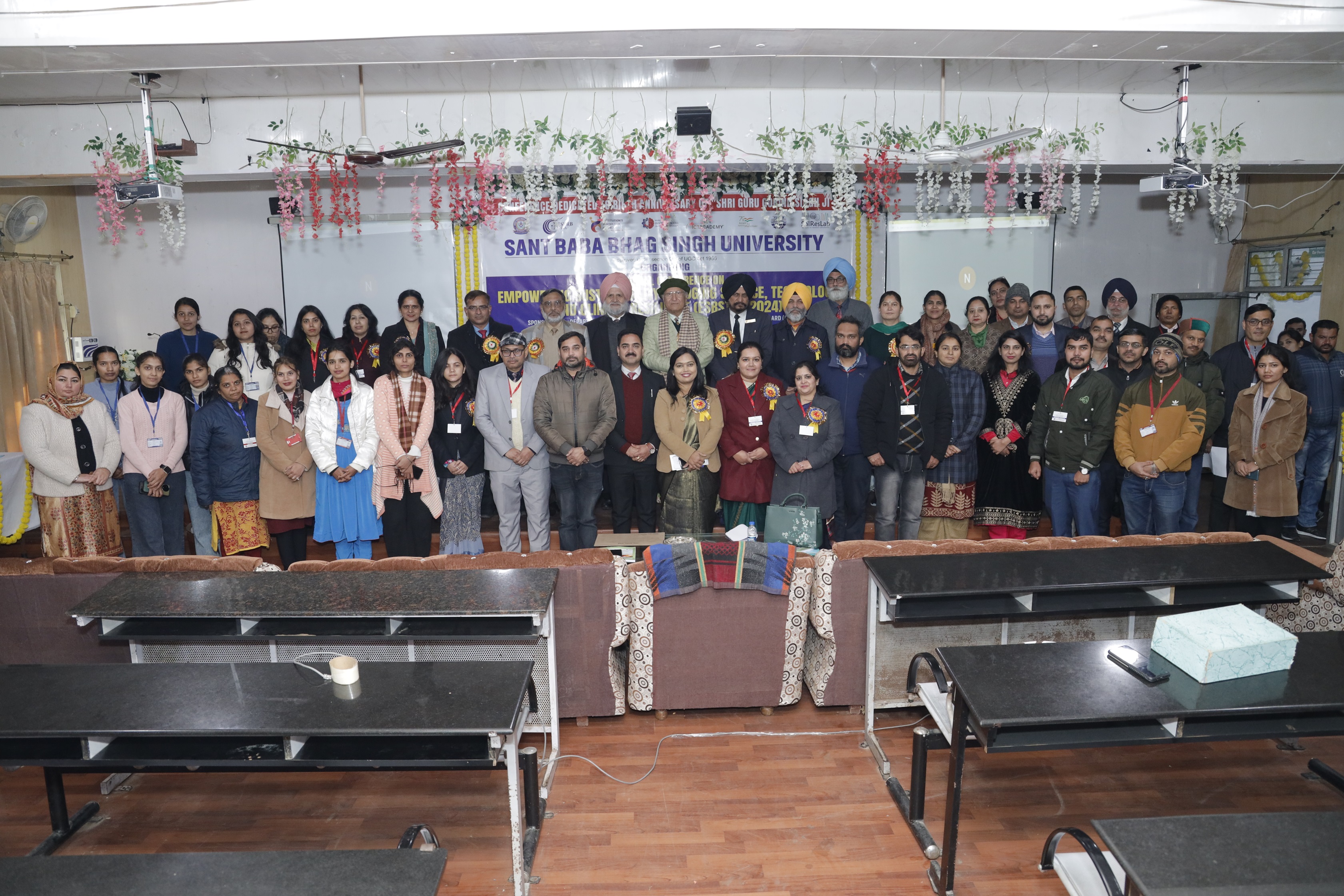
Day-2
Day 2 of ESBSTCR-2024 was commenced with full of enthusiasm. After the briefing of the Conference report of the previous day by the organizing secretary of the conference (Dr. Younis Ahmad Hajam), the online and offline sessions of Day-2 commenced. Programme was started with oral presentation of (Young/Senior Scientist Award Category). Unider young scientist caaward category, the nominated candidate Dr. Aditya Gupta, Postdoctoral Research Fellow, United States Department of Agriculture, Agricultural Research Service, Beltsville Agricultural Research Center, Animal Parasitic Diseases Laboratory, Beltsville, MD, USA has present his work through online mode. Dr Gupta’s talk was based on taxonomy, histology, life cycle and Genome studies of various Sarcocystis species. He has mentioned that their study as unique as they studied the outbreak of clinical Equine Protozoal Myeloencephalitis (EPM)-like disease in naturally infected raccoons by the parasite Sarcocystis neurona which is an important cause of a serious neurological syndrome in horse and causes mortality in many species of animals, especially marine mammals. Thereafter, in senior scientist category, Dr. Vineet Kumar, Associate Professor (Biotechnology), School of Bioengineering & Biosciences, Lovely Professional University (LPU), Jalandhar- Punjab. He has discussed role of nanotechnology for Climate Change. He gave an informative lecture on nanoecotoxicity and contemporary technologies for nanomaterial synthesis, nanosensors, and monitoring of environmental pollutants, as well as nanomaterial interactions with plants and bacteria.
Afterward there was an invited talk of Dr Mohd Ashraf Rather, Assistant Professor cum junior Scientist, Division of Fish Genetics and Biotechnology, Faculty of Fisheries, SKUAST Kashmir. He has discussed several issues of aquaculture and nanotechnology. Sir has also discussed the regulatory implications of nanotechnology for fisheries and aquaculture activities.
Prof. (Dr.) Kanwardeep Singh. Head, Department of Virology, GMC Amritsar, Punjab & Director, PIMS, Jalandhar was Chief Guest of the day. Dr. Singh talked about many virological and pharmacological issues. He described the symptoms, pathogenesis, prevention, and treatment of colorectal cancer in detail. He emphasised the importance of prebiotics and probiotics for human health. Prof. (Dr.) G. S. Virk (Rt) from Department of Botanical & Environmental Sciences, Guru Nanak Dev University was the Guest of Honour. Prof. Virk stressed the utilisation of climate-resilient crops for environmental sustainability, the significance of blue-green algae, and the need of resource efficiency. He also emphasised the scope and development of various biotic and abiotic stress-resistant crops to ensure global food security. Prof. Aggrawal emphasised the utilisation of Spirulina, a blue-green algae, as a superfood for both health and the environment. Spirulina is commonly referred to as a nutraceutical or therapeutic food, and it has the potential to be used in the creation of new pharmaceutical formulations. Spirulina has a variety of different applications, including animal and fish food, bio-fertilizer, and green energy sources (bio fuel, biogas, and CNG). Dr. Gitender Singh, Scientific Officer-F, Department of Atomic Energy, BARC, Tarapur, Maharashtra (Invited expert) has also graced the occasion. After conference lunch there were four invited lectures of Dr. Gagan Bhargava, Chandigarh University, Mohali, Dr. Sumit Bhardwaj, Chandigarh University, Mohali, Dr. Rajnish Dhiman, MNIT Jaipur, Rajasthan and Dr. Himanshu Singh, School of Bioengineering and Biosciences, LPU, Jalandhar, through online mode. Dr. Gagan gave a talk on the relevance of ferrites as superparamagnetic materials and their function in waste water remediation. Dr Sumit has emphasised current breakthroughs in the synthesis and application of 2D nanomaterials in environmental monitoring and treatment procedures. Dr Himanshu Singh has highlighted genomic technology and the importance of genetic engineering in plants, particularly in major food crops such as rice, wheat and maize, which have revolutionised farming and nutrition. Dr. Rajnish has provided a full description of several energy storage devices and production procedures. He has mentioned the Zn-air battery (ZAB), an effective bifunctional catalyst, and gel-based batteries with improved properties for future energy storage. Prof. (Dr.) Daizy Rani Batish, a well-known ecologist and plant scientist from Panjab University, Chandigarh has graced the occasion. Dr Batish has provided an informative discussion regarding invasive plant species. She asked the attendees to reduce their use of invasive plant species in order to save the ecosystem and our planet. Finally, Prof. (Dr.) Dharmjit Singh Parmar, Vice-Chancellor of SBBSU, honoured all of the day's guests with plant saplings and mementos as tokens of appreciation. More than 40 participants from various institutes delivered papers and posters via online mode. All attendees were introduced to a variety of lecture topics on environmental challenges, sustainability, and climate resilience. Day 2 closed with enthusiastic participation, effective presentations, and a vast information resource supplied by all guests.
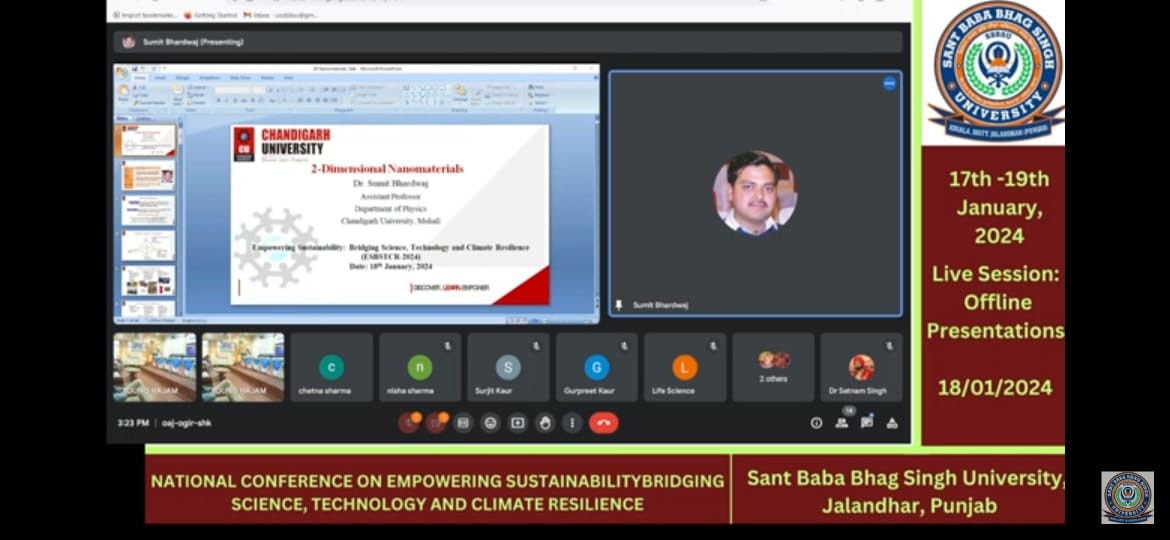
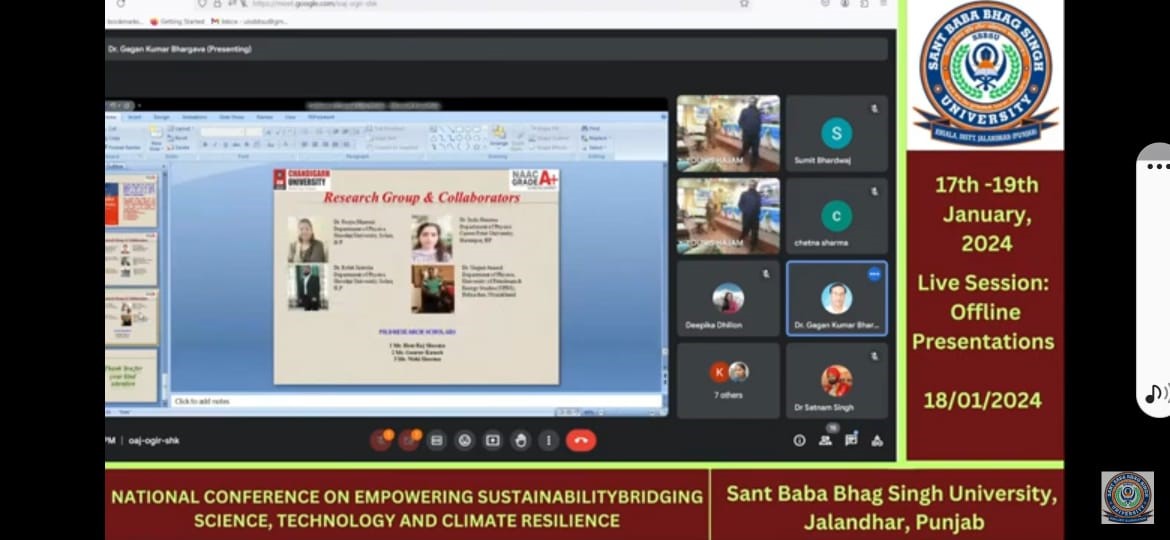
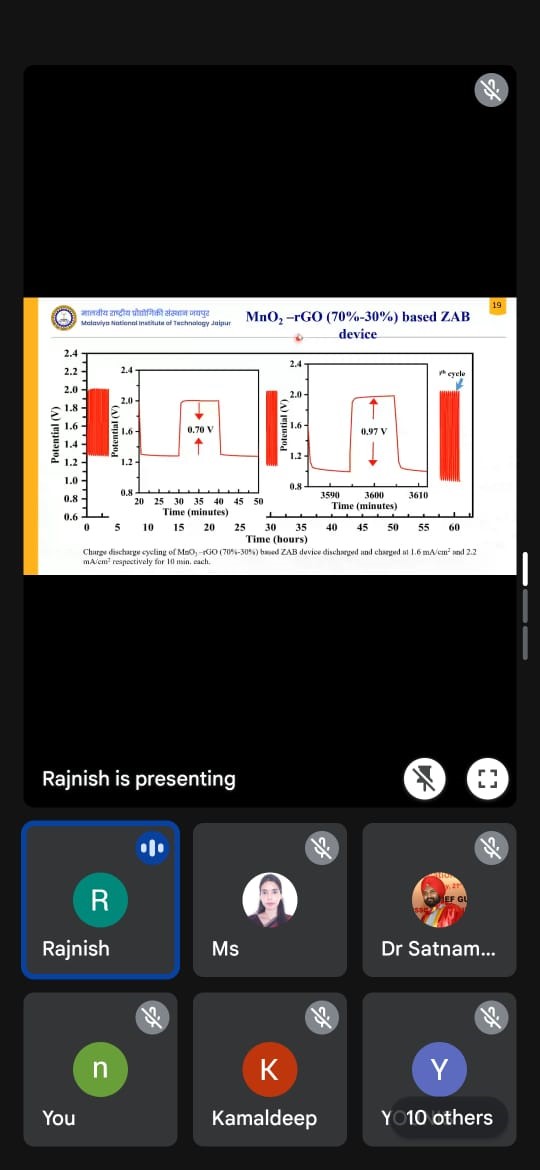
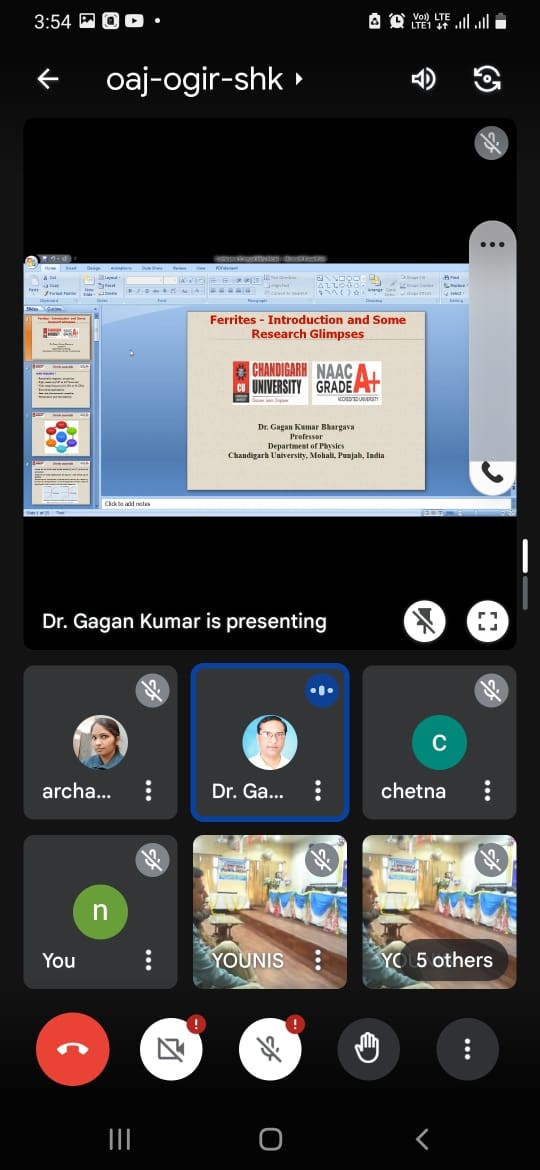
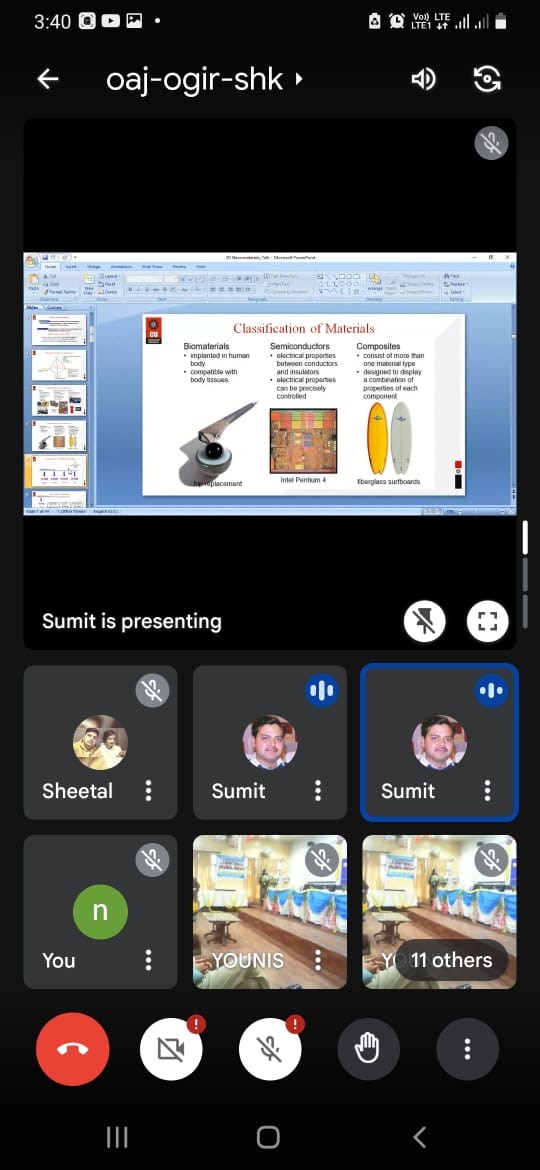
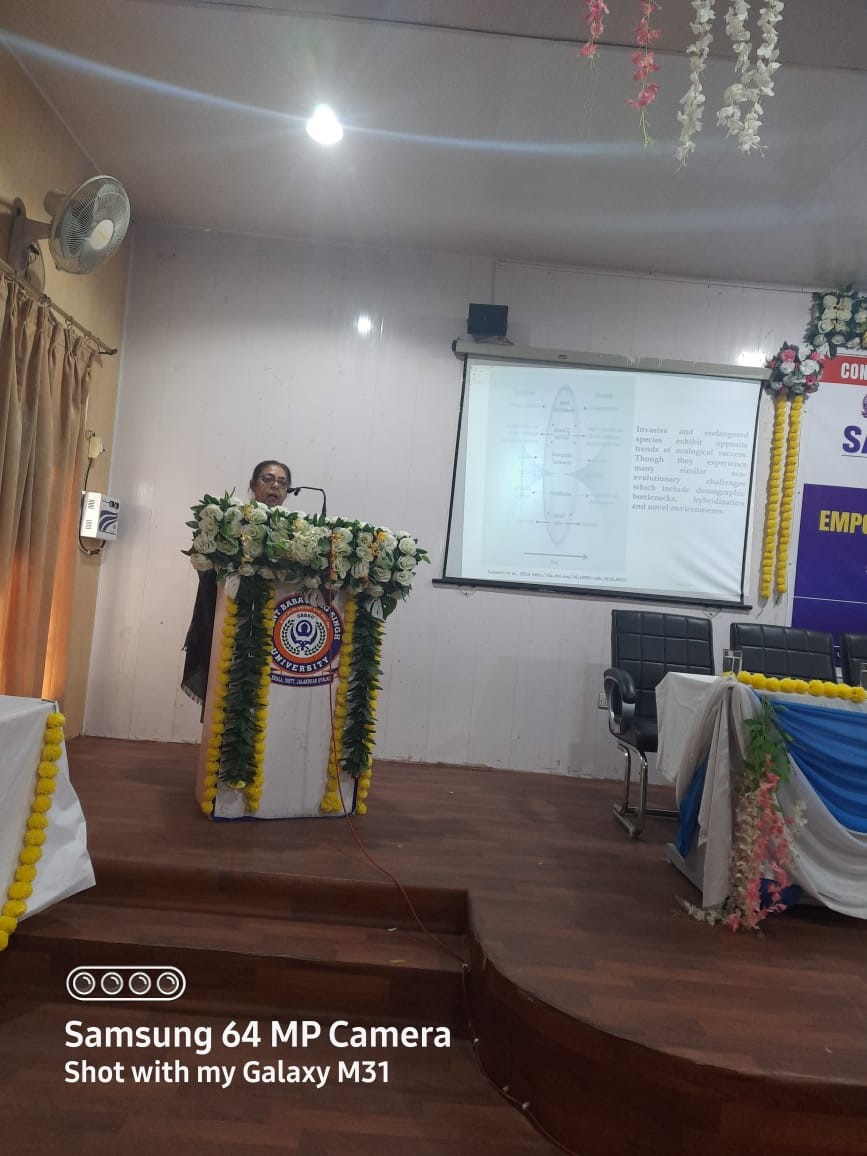
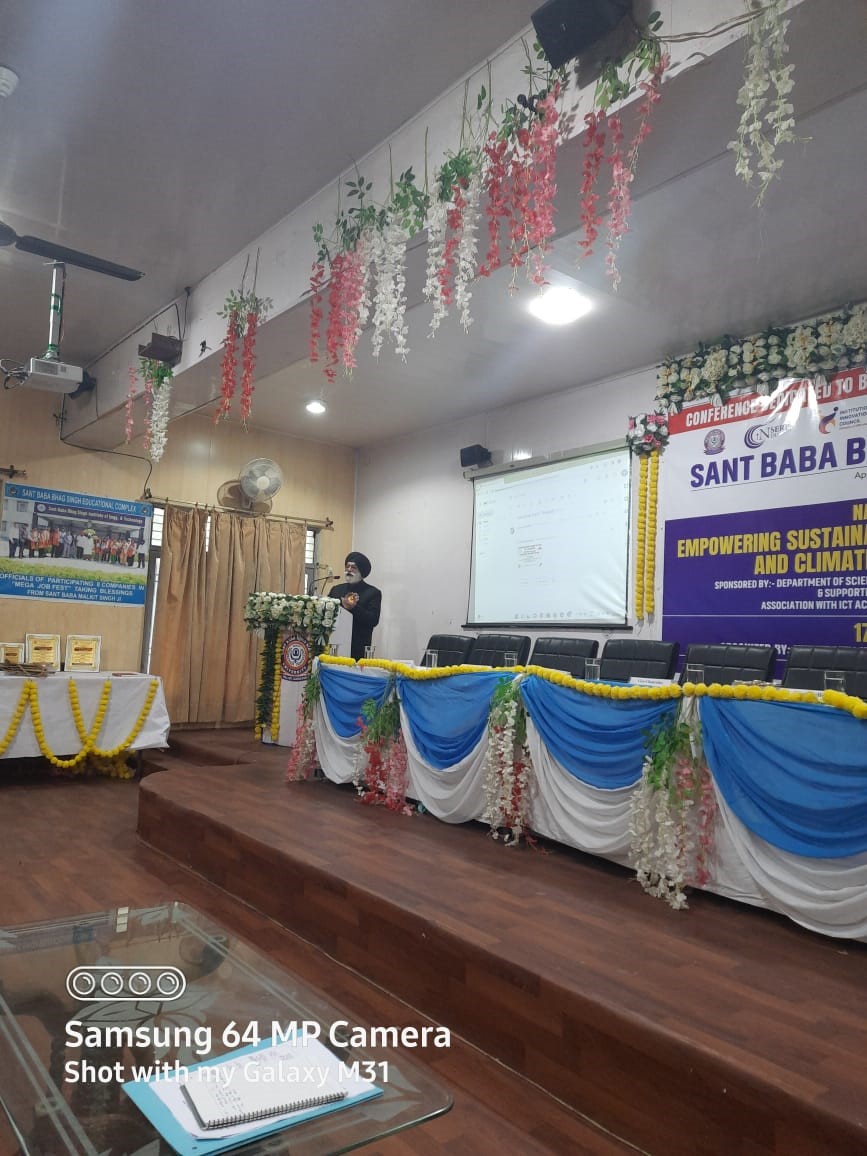
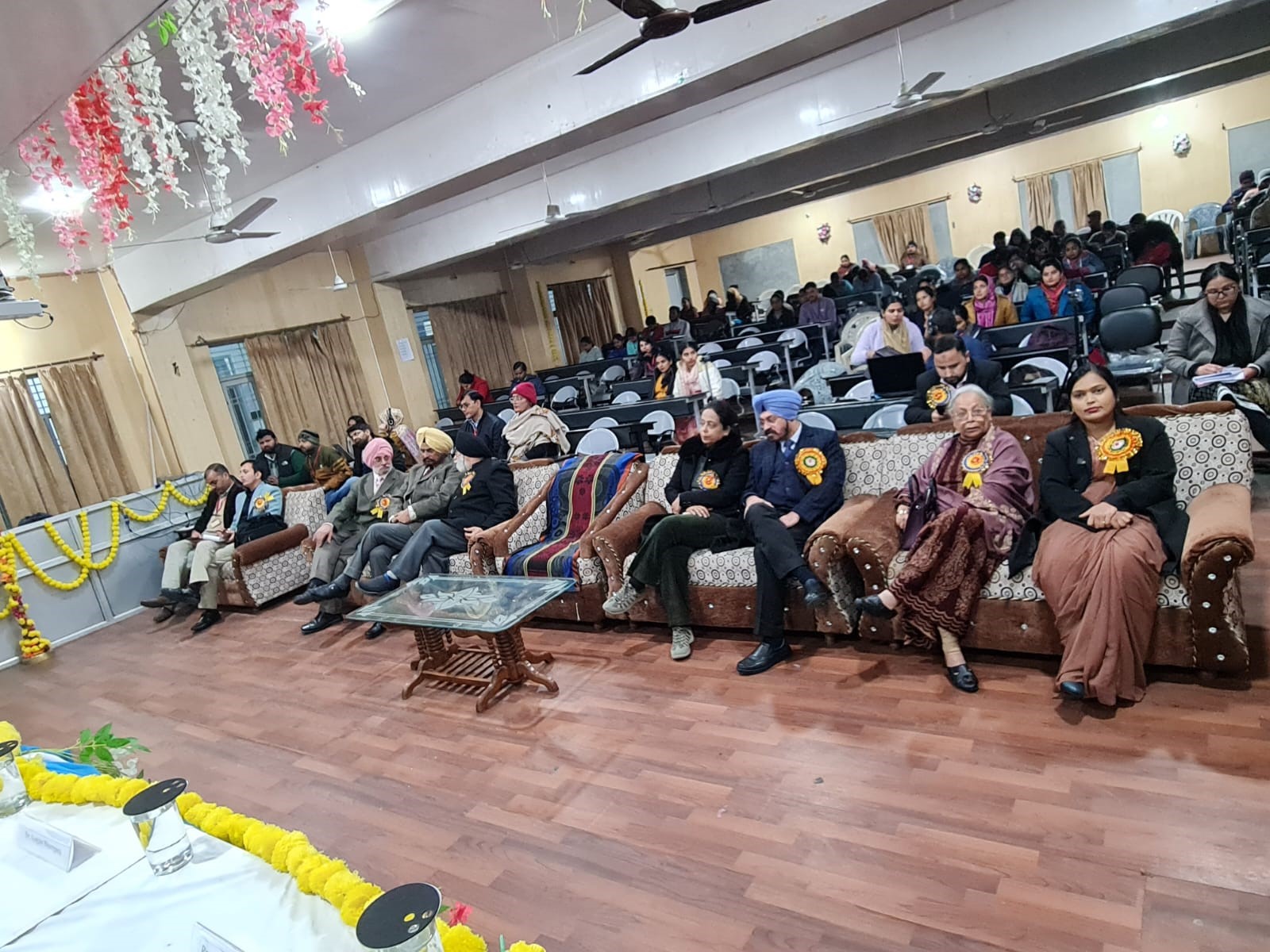
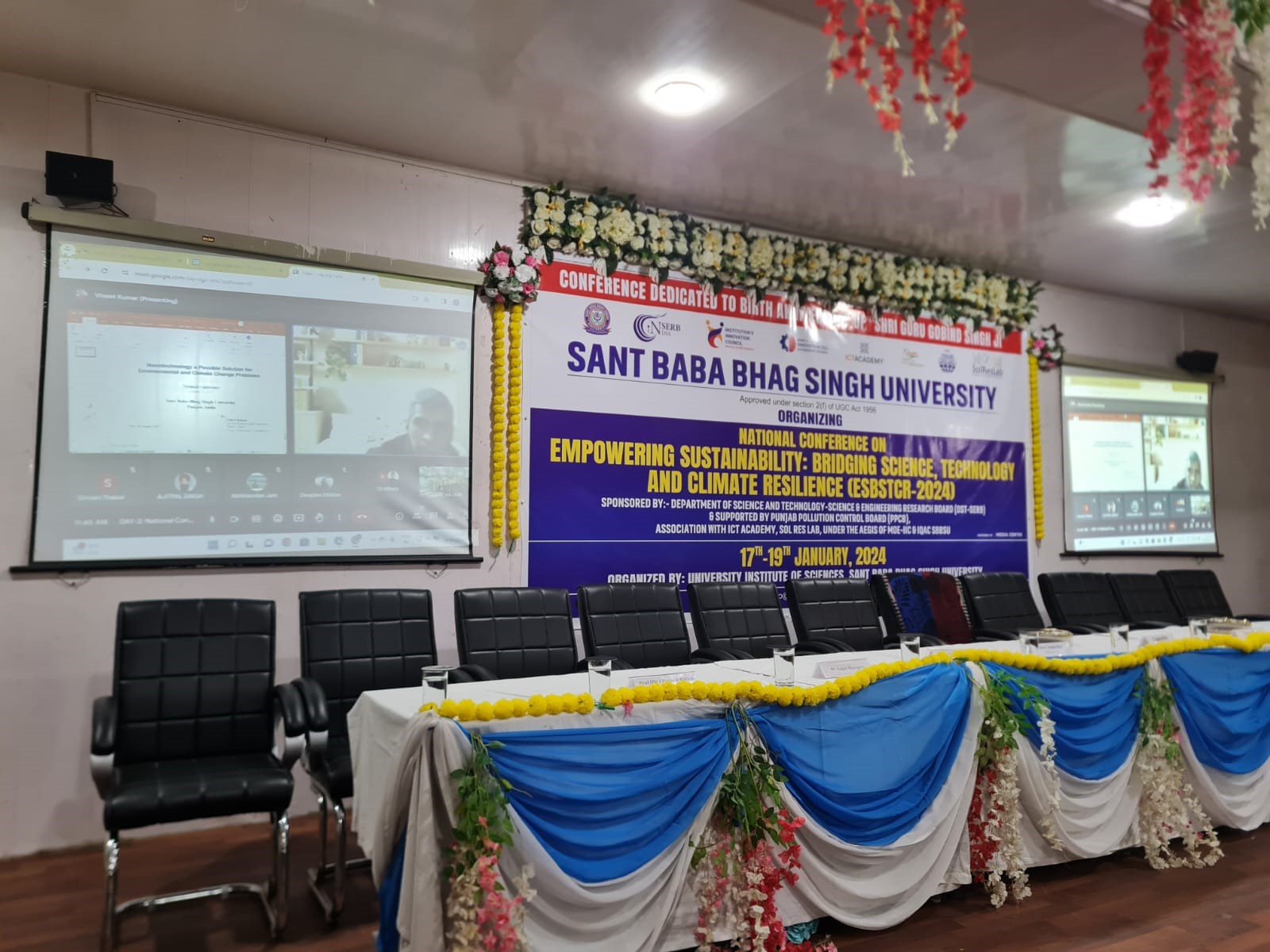
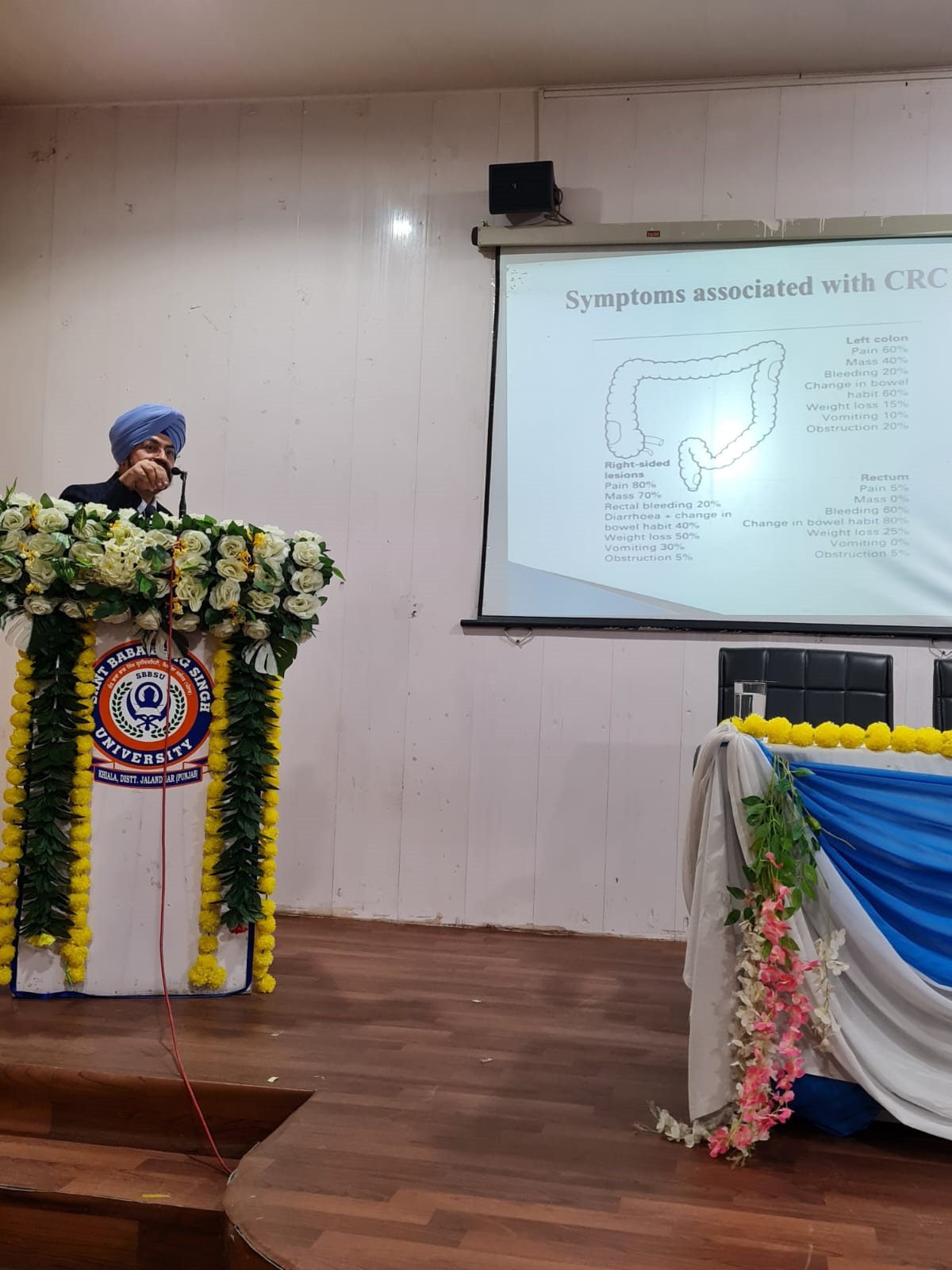
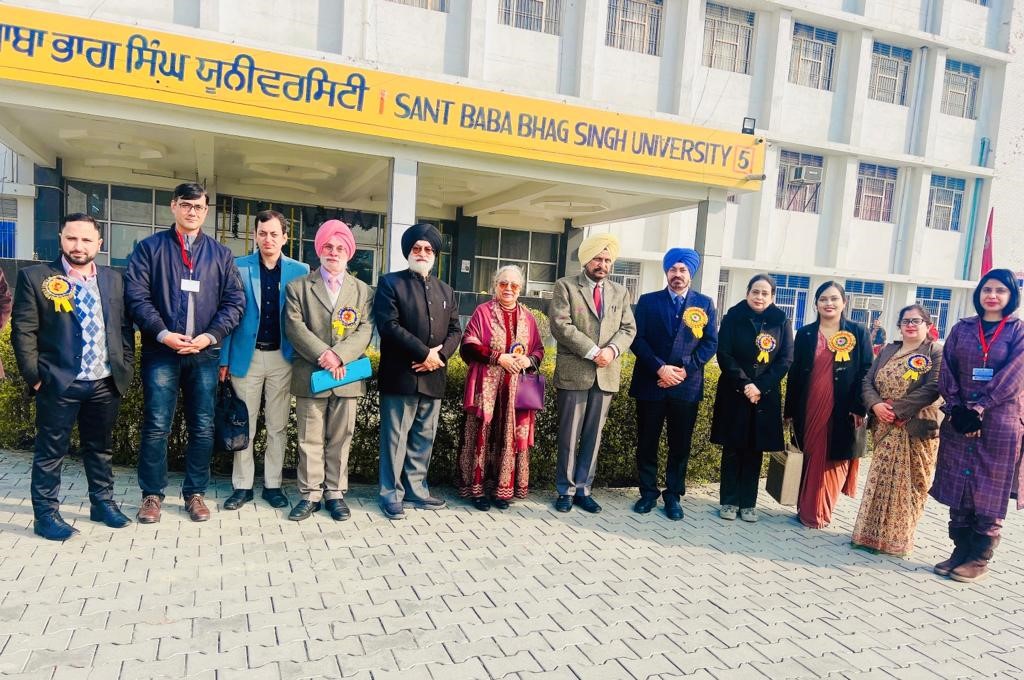
Day-3
Day-3 (19th January, 2024) of ESBSTCR-2024 was commenced with full motivation and enthusiasm. A brief report of previous day and schedule for technical sessions have been presented by Dr Younis Ahmad Hajam (Organizing Secretary of the Conference). There were 3 expert talks, 6 invited talks scheduled along with online oral presentations. First talk of the day was delivered through online mode by Prof (Dr) Jyoti Prakash (Department of Mathematics and Statistics, HPU, Shimla). He has emphasised sustainable alternatives, as well as the significance of mathematics in climate change monitoring and research. Dr. Virender Singh (Department of Chemistry, Central University Punjab) has delivered invited lecture on synthesis and functionalization of natural products especially β-Carboline Based Privileged Scaffolds. He has emphasized importance of these nuclei in modern drug design. Prof. (Dr.) Pritpal Singh, Vice Chancellor, SGGSWU, Fatehgarh Sahib, Punjab, attended the conference via online mode and delivered a brief session on waste and water degradation, emphasising the critical need for some novel approaches to be used for water treatment. Thereafter, an online expert talk of Prof (Dr.) Asim Kumar Jana from Department of Biotechnology, NIT Jalandhar was conducted. Prof Jana delivered valuable talk about bioprocess engineering, biomass residues conversion to fuel as futuristic strategies for sustainable smart management. As Invited speaker of the day, Dr. Gitender Singh, Scientific Officer-F, Department of Atomic Energy, BARC, Tarapur, Maharashtra delivered an eye-opening talk on nuclear fuels, systematic evolution of nuclear reactor Programmes of India. He emphasized the importance of thorium and plutonium-based nuclear fuels as sustainable fuels in the future. He highlighted BARC's nuclear fuel characterization techniques. Sir has elaborated on the importance of microwaves in fuel characterization and clarified a common myth about nuclear fuel safety and microwave-processed food practices. Dr. Singh has also addressed various queries from the participants. Afterward an invited talk was delivered by Dr Rajesh Kumar from Department of Biosciences, HPU Shimla. Dr. Kumar has emphasized the significance of Honey in our lives and apiculture as a futuristic agricultural business. Sir has also provided the method of analysis of pure and adulterated honey. Dr. Kumar has stressed upon adoption of hygiene practices and local to global approach for making Honey as business. As highlighted by the expert, changing climate has adverse effect on the honey bee habitats and their life cycles. This lecture was highly appreciated by the participants. Dr. Ramanbala from the Department of Environmental Science at Gurugram University, Gurugram, Haryana, also gave an online invited talk. She discussed the importance of biodiversity in nature, as well as the current state of biodiversity decrease in India and around the world. Dr. Onkar Singh Brraich from the Department of Zoology at Punjabi University Patiala gave the session's final invited talk. Sir has discussed some important features of the wetland ecology and how climate change is influencing it. He underlined the importance of taking immediate action to prevent climate change and achieve sustainability. Participants online presentations included a wide range of theme-based subjects such as climate resilience, sustainability, environmental toxicity, and the role of IoT in agriculture. During the Valedictory Session, the Organising Secretory (Dr Younis Ahmad Hajam) delivered the 3-day conference report. Award ceremony was announced by Dr Aksh Sharma (Co-Convener). Senior Scientist Award was conferred to Dr Vineet Kumar, Associate Professor from LPU, Punjab. Young Scientist Award was fetched by Dr. Aditya Gupta, Post Doc fellow from USDA, USA. Dr Meetu Bhatti, Assistant Professor from All India Jat Heroes' Memorial College, Haryana was awarded with Best Poster Presentation Award and Ms Ipsa Gupta, Research Scholar from Punjab University, Chandigarh bagged Best Oral Presentation Award. Online Valedictory Address was delivered by Chief Guest (Prof. (Dr.) Adarsh Pal Vig, Chairman, Punjab Pollution Control Board, Punjab). On this occasion, Sant Baba Bhag Singh University bestowed the Sant Baba Malkit Singh Ji Memorial "Environmentalist of the Year-2023" Award on Prof. (Dr.) Adarsh Pal Vig in recognition of his outstanding contributions to vermitechnology, earthworm ecology, solid waste management, and leadership in linking science, public policy, and citizen engagement to address urgent global environmental change and empower sustainability. The awards to the winners and certificates to the participants were presented by the Guest of Honor, Sant Baba Manmohan Singh Ji, Chancellor, SBBSU and Prof. (Dr.) Dharmjit Singh Parmar, Vice-Chancellor, SBBSU along with the S. Hardaman Singh Minhas, Secretary, SBBSMCS, esteemed members of management, Registrar, Dean Academics and Controller of Examination, SBBSU. The entire ESBSTCR-2024 organising team also received an award of appreciation for their tireless work and contributions to the three-day conference. Dr. Shweta Singh (Dean, University Institute of Sciences and Conference Convener) concluded by thanking all the authorities, conference sponsors, invited speakers, participants, and organising members. This conference platform has provided a wealth of knowledge and research ideas for young researchers, justifying the conference's theme, "Empowering Sustainability: Bridging Science, Technology, and Climate Resilience."
